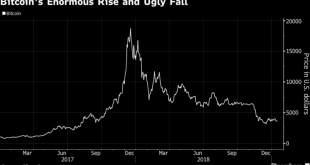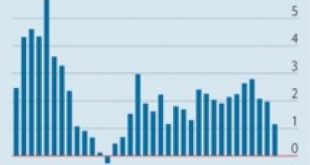2018 was an Annus Horribilis for the entire crypto industry. Believers and crypto enthusiasts, swept up by the rally of 2017, found themselves on the wrong side of a crashing market. On the right side where the early critics, who were once accused of cynicism and a lack of imagination for calling the crypto market a bubble, and were finally vindicated. As the media eventually turned on the sector and gleefully reported on its demise, investor sentiment soured and soon anyone who’d ever...
Read More »As Germany goes, so goes the Eurozone
Until recently, Germany has been the seemingly unbreakable workhorse that has pulled the European economy back from the brink and kept it ticking along through a myriad of internal and external pressures, as well as political crises, over the last decade. As the undeniable leader of the bloc, the country has spearheaded and supported rescue plans for the Eurozone’s weaker links, as well as a number of controversial policies that work towards further centralization within the EU. However,...
Read More »The Best Economists
The Economist characterizes the work of who it views as the eight best economists of the decade. Most of their work is empirical. The eight are: Isaiah Andrews, Melissa Dell, Nathaniel Hendren, and Stefanie Stantcheva of Harvard Parag Pathak and Heidi Williams of MIT Emi Nakamura of UC Berkeley Amir Sufi of Chicago Booth
Read More »The Best Economists
The Economist characterizes the work of who it views as the eight best economists of the decade. Most of their work is empirical. The eight are: Isaiah Andrews, Melissa Dell, Nathaniel Hendren, and Stefanie Stantcheva of Harvard Parag Pathak and Heidi Williams of MIT Emi Nakamura of UC Berkeley Amir Sufi of Chicago Booth
Read More »The Great War Christmas Truce: ‘They Were Positively Human’
“Wishing all of you a very Merry Christmas and only the very best for 2019! I hope you will enjoy reading this article, written by Hunter Derensis, which reminded me immediately of what Ayn Rand said about man: “ “Man – every man – is an end in himself, not a means to the ends of others; he must live for his own sake, neither sacrificing himself to others nor sacrificing others to himself.” Warmest regards, Claudio A 19th-century peace activist once asked, “Is it possible that any...
Read More »Venezuela: when fiat money reaches its intrinsic value
Over the last years, Venezuela has become a modern poster child for the failure of socialism and with good reason. It offers an abundance of lessons and stern warnings for many western nations, but it also provides a very insightful and relevant reminder for individual investors too. Economic, social and human costs Within the space of 5 years, a combination of plunging oil prices and extreme socialist policies have brought the country to its knees, together with its increasingly...
Read More »Why Am I Fighting for the Gold Standard?
Life is good. They could not have imagined what we have now, back in the dark ages. So I have never understood why people prep for a return to the dark ages. The only thing I can think of is that they don’t really picture what life is like. 14 hours a day of back-breaking labor to eke out a subsistence living. Subject to the risks of rain, sun, and insects. Prepping makes no sense to me. I don’t know if I would choose...
Read More »Marx was Right—Partly
According to René Scheu in the NZZ. Die zehn «Massregeln» für die «fortgeschrittensten Länder», in die das «Kommunistische Manifest» mündet, lesen sich aus heutiger Sicht wie ein sozialdemokratisches Programm, dem auch viele softbürgerliche Politiker sogleich vorbehaltlos zustimmen würden. Starke Progressivsteuer, Geldmonopol der Nationalbank, Zentralisation des Transportwesens, nationale Industriepolitik, Verstaatlichung des Bauernstandes und unentgeltliche Erziehung aller Kinder gehören...
Read More »History of Economic Thought
A concise overview with timeline.
Read More »“Nobel Prize-Winning Contributions to Economics”
Economics is not about predicting stock markets, exchange rates, or GDP. Its aim is to make sense of human interaction in the small and the large. Marek Hlavac’s online course Nobel Prize-Winning Contributions to Economics provides an overview over the work of deep economic thinkers.
Read More » Swiss Economicblogs.org
Swiss Economicblogs.org



